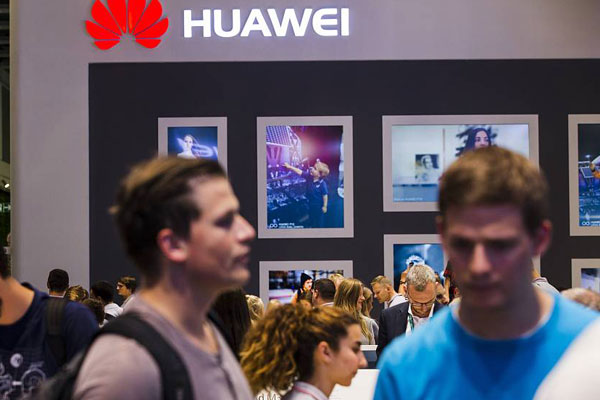Media Report

- Bloomberg reports: "The U.S. and China are moving closer to their first face-to-face trade negotiations in months, with a meeting between tech chief executives and President Donald Trump on Monday marking another step toward easing a ban on sales to China's Huawei Technologies Co.The White House invited many of the U.S.'s biggest technology companies to discuss economic issues including a possible resumption of sales to Huawei. Trump and senior administration officials met with CEOs from Alphabet Inc.'s Google, Broadcom Inc., Cisco Systems Inc., Intel Corp., Micron Technology Inc., Western Digital Corp. and Qualcomm Inc., according to White House spokesman Judd Deere. Deere said the CEOs had requested 'timely' decisions on license applications to sell to Huawei and Trump agreed. National Economic Council director Larry Kudlow told reporters Tuesday that the meeting was positive and cited it as one reason he's optimistic that in-person talks with China are likely to resume soon."
- Reuters reports: Russia carried out what it said was its first long-range joint air patrol in the Asia-Pacific region with China on Tuesday, a mission that triggered hundreds of warning shots, according to South Korean officials, and a strong protest from Japan. The flight by two Russian Tu-95 strategic bombers and two Chinese H-6 bombers, backed up by a Russian A-50 early warning plane and its Chinese counterpart, a KJ-2000, marks a notable ramping-up of military cooperation between Beijing and Moscow. That is something likely to worry politicians from Washington to Tokyo and could complicate relations and raise tension in a region that has for years been overshadowed by hostility between the United States and North Korea. While troops and naval ships from Russia and China have taken part in joint war games before, they have not, according to Russia's Ministry of Defence, conducted such air patrols in the Asia-Pacific region together until Tuesday.
- The New York Times:Li Peng, Chinese Leader Derided for Role in Tiananmen Crackdown, Dies at 90 VideoThe New York Times reports: "Li Peng, the former Chinese premier derided as the stone-faced "butcher of Beijing" for his role in the bloody crackdown on the Tiananmen Square democracy movement in 1989, died on Monday in the Chinese capital. He was 90. Mr. Li's death was announced on Tuesday by Xinhua, the state-run news agency. Xinhua's report gave no specific cause of death, saying only that medical treatment had failed. Born to Communist revolutionaries in the early years of the Chinese civil war and educated as a hydroelectric engineer in the Soviet Union, Mr. Li rose to the top ranks of the Communist Party, serving as a bridge between the old guard of revolutionaries and the more technocratic leaders who succeeded them."
- CNBC reports: "U.S. President Donald Trump said on Monday that he believed Chinese President Xi Jinping has acted 'very responsibly' with the protests in Hong Kong. For over two months, political tensions in Hong Kong have escalated over a proposed extradition bill that would allow those arrested in the territory to be sent to mainland China for trial. Hong Kong citizens are concerned that their civil rights could be slowly eroded under Beijing. 'You know, you could say what you said, but you could also say that he has allowed that to go on for a long time, and, you know, it's been relatively — I think it's been relatively non-violent,' said Trump, according to a White House transcript. He was speaking to reporters at the White House before a meeting with Pakistani Prime Minister Imran Khan. Trump added that 'China could stop them if they wanted.'"
Calendar
- 2019-07-22 Chinese Money in the U.S. Dries Up as Trade War Drags On
- 2019-07-21 Chinese Money in the US Dries Up as Trade War Drags On
- 2019-07-19 U.S., China Trade Negotiators Talk for Second Time Since Truce
- 2019-07-18 U.S.-China trade talks continue, in-person meeting may be planned: Mnuchin
- 2019-07-17 Bills targeting China's Huawei introduced in Congress
- 2019-07-16 Tariffs on China Don’t Cover the Costs of Trump’s Trade War
- 2019-07-15 China posts slowest economic growth in 27 years; Trump touts ‘major effect’ of tariffs
- 2019-07-14 Huawei Plans Extensive Layoffs in the US
- 2019-07-12 China to Sanction U.S. Companies for Arms Sales to Taiwan
- 2019-07-11 Trump team fears new face on China trade team signals tougher stance
News
- Bloomberg Trump Agrees to Timely Decisions on Huawei as China Talks Near
- Reuters First Russian-Chinese air patrol in Asia-Pacific draws shots from South Korea
- The New York Times Li Peng, Chinese Leader Derided for Role in Tiananmen Crackdown, Dies at 90 Video
- CNBC Trump says China's leader Xi Jinping has acted 'very responsibly' on Hong Kong protests
- Bloomberg Hit by 93% Tax, Napa Wine Falls Victim to Trade War in China
- The Washington Post Trump says China is paying his tariffs, but U.S. companies keep getting the bill
- The Wall Street Journal Chinese Tycoon Holed Up in Manhattan Hotel Is Accused of Spying for Beijing
- Reuters China tells U.S. to remove 'black hands' from Hong Kong
- The New York Times Philippines Has Little Power Against China, Duterte Tells Lawmakers
- Bloomberg China's Beef Imports Hit Record as Deadly Swine Fever Spreads
- CNN US sanctions Chinese company for buying Iranian oil. Beijing slams 'bullying' behavior
- Reuters Europeans, China, Russia to meet Iran in Vienna on July 28
- The New York Times Beijing Auto Buys Daimler Stake, Bolstering German Carmaker's Ties to China
Commentary
- The New York Times Bearing the Burden: The Plight of Women in China
- The Diplomat The US Scare Campaign Against China
- Financial Times A cricketing revolution hopes to find China's future players
- The Atlantic Trump Is a 'Source of Hope' for Taiwan
- The National Interest China's Debt Debacle
- The Diplomat China's Tech Sector Is in Trouble